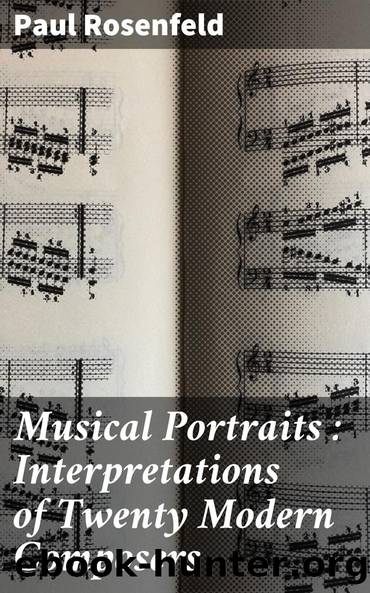Musical Portraits : Interpretations of Twenty Modern Composers by Paul Rosenfeld

Author:Paul Rosenfeld [Rosenfeld, Paul]
Language: eng
Format: epub
ISBN: 9781298347459
Google: pBhHrgEACAAJ
Publisher: Creative Media Partners, LLC
Published: 2015-02-19T00:24:16+00:00
For he was in no sense as nobly human of stature, as deeply aware of the life about him, as Moussorgsky. Nor did he feel within himself Borodin's rich and vivid sense of the past. Cui was right when he accused Rimsky of wanting "nerve and passionate impulse." He was, after all, temperamentally chilly. "The people are the creators," Glinka had told the young nationalist composers, "you are but the arrangers." It was precisely the vital and direct contact with the source of all creative work that Rimsky-Korsakoff lacked. There is a fault of instinct in men like him, who can feel their race and their environment only through the conscious mind. Just what in Rimsky's education produced his intellectualism, we do not know. Certainly it was nothing extraordinary, for society produces innumerable artists like him, who are fundamentally incapable of becoming the instrument every creative being is, and of discovering through themselves the consciousness of their fellows. Whatever its cause, there is in such men a fear of the unsealing of the unconscious mind, the depository of all actual and vital sensations, which no effort of their own can overcome. It is for that reason that they have so gigantic and unshakable a confidence in all purely conscious processes of creation, particularly in the incorporation of a priori theories. So it was with Rimsky. There is patent in all his work a vast love of erudition and a vast faith in its efficacy. He is always attempting to incarnate in the flesh of his music law abstracted from classical works. Even Tchaikowsky, who was a good deal of an intellectualist himself, and dubbed "perfect," in a characteristically servile letter, every one of the thirty practice fugues that Rimsky composed in the course of a single month, complained that the latter "worshiped technique" and that his work was "Full of contrapuntal tricks and all the signs of a sterile pedantry." It was not that Rimsky was pedantic from choice, out of a wilful perversity. His obsession with intellectual formulas was after all the result of a fear of opening the dark sluices through which surge the rhythms of life.
If Rimsky-Korsakoff was not absolutely sterile, it was because his intellectual quality itself was vivacious and brilliant. Though he remained ever a stranger to Russia and his fellows, as he did to himself, he became the most observant of travelers. Though as the foreigner he perceived only the superficial and picturesque elements of the life of the landâits Orientalism, its barbaric coloringâand found his happiest expression in a fantasy after the "Thousand Nights and a Night," he noted his impressions skilfully and vividly, with an almost virtuosic sense of his material. If he could not paint the spring in music, he could at least embroider the score of "Sniegourochka" delightfully with birdcalls and all manner of vernal fancies. If he could not recreate the spirit of peasant art, he could at least, as in "Le Coq d'or," imitate it so tastefully that,
Download
This site does not store any files on its server. We only index and link to content provided by other sites. Please contact the content providers to delete copyright contents if any and email us, we'll remove relevant links or contents immediately.
Aircraft Design of WWII: A Sketchbook by Lockheed Aircraft Corporation(32277)
The Great Music City by Andrea Baker(31913)
Call Me by Your Name by André Aciman(20486)
The Secret History by Donna Tartt(19034)
The Art of Boudoir Photography: How to Create Stunning Photographs of Women by Christa Meola(18612)
Shoot Sexy by Ryan Armbrust(17720)
Plagued by Fire by Paul Hendrickson(17401)
Portrait Mastery in Black & White: Learn the Signature Style of a Legendary Photographer by Tim Kelly(16996)
Adobe Camera Raw For Digital Photographers Only by Rob Sheppard(16968)
Photographically Speaking: A Deeper Look at Creating Stronger Images (Eva Spring's Library) by David duChemin(16678)
Ready Player One by Cline Ernest(14633)
Pimp by Iceberg Slim(14479)
Bombshells: Glamour Girls of a Lifetime by Sullivan Steve(14046)
The Goal (Off-Campus #4) by Elle Kennedy(13651)
Art Nude Photography Explained: How to Photograph and Understand Great Art Nude Images by Simon Walden(13028)
Kathy Andrews Collection by Kathy Andrews(11809)
The Priory of the Orange Tree by Samantha Shannon(9058)
The remains of the day by Kazuo Ishiguro(8968)
Thirteen Reasons Why by Jay Asher(8885)
